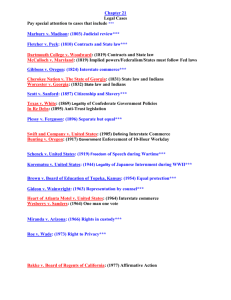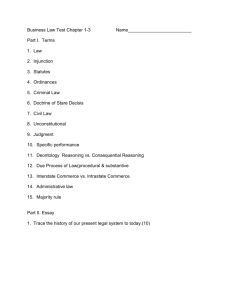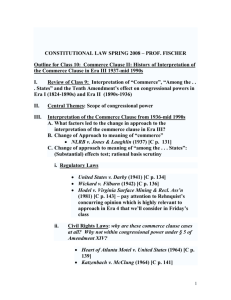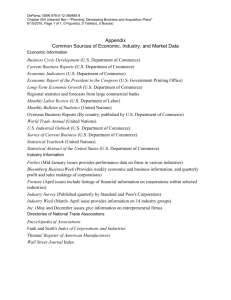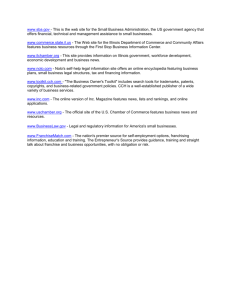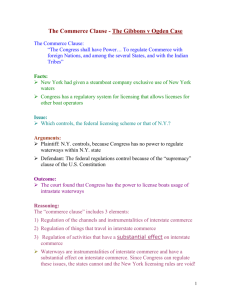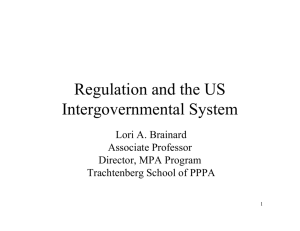WICKARD v. FILBURN
advertisement
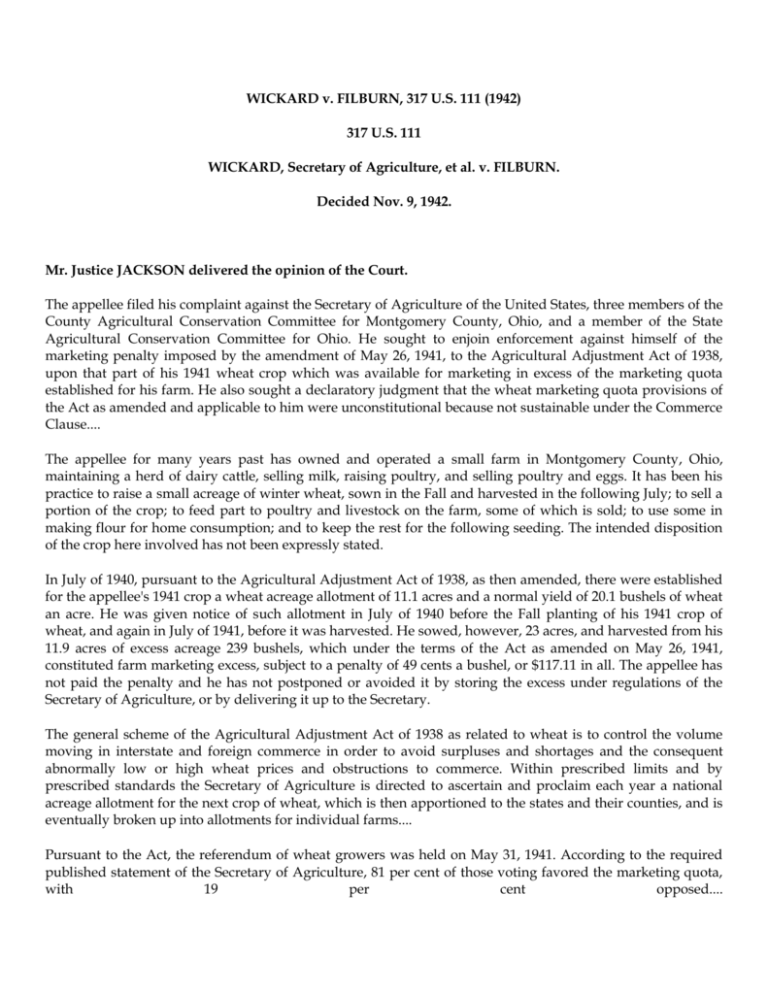
WICKARD v. FILBURN, 317 U.S. 111 (1942) 317 U.S. 111 WICKARD, Secretary of Agriculture, et al. v. FILBURN. Decided Nov. 9, 1942. Mr. Justice JACKSON delivered the opinion of the Court. The appellee filed his complaint against the Secretary of Agriculture of the United States, three members of the County Agricultural Conservation Committee for Montgomery County, Ohio, and a member of the State Agricultural Conservation Committee for Ohio. He sought to enjoin enforcement against himself of the marketing penalty imposed by the amendment of May 26, 1941, to the Agricultural Adjustment Act of 1938, upon that part of his 1941 wheat crop which was available for marketing in excess of the marketing quota established for his farm. He also sought a declaratory judgment that the wheat marketing quota provisions of the Act as amended and applicable to him were unconstitutional because not sustainable under the Commerce Clause.... The appellee for many years past has owned and operated a small farm in Montgomery County, Ohio, maintaining a herd of dairy cattle, selling milk, raising poultry, and selling poultry and eggs. It has been his practice to raise a small acreage of winter wheat, sown in the Fall and harvested in the following July; to sell a portion of the crop; to feed part to poultry and livestock on the farm, some of which is sold; to use some in making flour for home consumption; and to keep the rest for the following seeding. The intended disposition of the crop here involved has not been expressly stated. In July of 1940, pursuant to the Agricultural Adjustment Act of 1938, as then amended, there were established for the appellee's 1941 crop a wheat acreage allotment of 11.1 acres and a normal yield of 20.1 bushels of wheat an acre. He was given notice of such allotment in July of 1940 before the Fall planting of his 1941 crop of wheat, and again in July of 1941, before it was harvested. He sowed, however, 23 acres, and harvested from his 11.9 acres of excess acreage 239 bushels, which under the terms of the Act as amended on May 26, 1941, constituted farm marketing excess, subject to a penalty of 49 cents a bushel, or $117.11 in all. The appellee has not paid the penalty and he has not postponed or avoided it by storing the excess under regulations of the Secretary of Agriculture, or by delivering it up to the Secretary. The general scheme of the Agricultural Adjustment Act of 1938 as related to wheat is to control the volume moving in interstate and foreign commerce in order to avoid surpluses and shortages and the consequent abnormally low or high wheat prices and obstructions to commerce. Within prescribed limits and by prescribed standards the Secretary of Agriculture is directed to ascertain and proclaim each year a national acreage allotment for the next crop of wheat, which is then apportioned to the states and their counties, and is eventually broken up into allotments for individual farms.... Pursuant to the Act, the referendum of wheat growers was held on May 31, 1941. According to the required published statement of the Secretary of Agriculture, 81 per cent of those voting favored the marketing quota, with 19 per cent opposed.... II. It is urged that under the Commerce Clause of the Constitution, Article I, 8, clause 3, Congress does not possess the power it has in this instance sought to exercise. The question would merit little consideration since our decision in United States v. Darby, sustaining the federal power to regulate production of goods for commerce except for the fact that this Act extends federal regulation to production not intended in any part for commerce but wholly for consumption on the farm...Hence, marketing quotas not only embrace all that may be sold without penalty but also what may be consumed on the premises. Wheat produced on excess acreage is designated as 'available for marketing' as so defined and the penalty is imposed thereon. Penalties do not depend upon whether any part of the wheat either within or without the quota is sold or intended to be sold. Appellee says that this is a regulation of production and consumption of wheat. Such activities are, he urges, beyond the reach of Congressional power under the Commerce Clause, since they are local in character, and their effects upon interstate commerce are at most 'indirect.' In answer the Government argues that the statute regulates neither production nor consumption, but only marketing; and, in the alternative, that if the Act does go beyond the regulation of marketing it is sustainable as a 'necessary and proper' implementation of the power of Congress over interstate commerce. The Government's concern lest the Act be held to be a regulation of production or consumption rather than of marketing is attributable to a few dicta and decisions of this Court which might be understood to lay it down that activities such as 'production,' 'manufacturing,' and 'mining' are strictly 'local' and, except in special circumstances which are not present here, cannot be regulated under the commerce power because their effects upon interstate commerce are, as matter of law, only 'indirect.' Even today, when this power has been held to have great latitude, there is no decision of this Court that such activities may be regulated where no part of the product is intended for interstate commerce or intermingled with the subjects thereof. We believe that a review of the course of decision under the Commerce Clause will make plain, however, that questions of the power of Congress are not to be decided by reference to any formula which would give controlling force to nomenclature such as 'production' and 'indirect' and foreclose consideration of the actual effects of the activity in question upon interstate commerce. At the beginning Chief Justice Marshall described the Federal commerce power with a breadth never yet exceeded. He made emphatic the embracing and penetrating nature of this power by warning that effective restraints on its exercise must proceed from political rather than from judicial processes. For nearly a century, however, decisions of this Court under the Commerce Clause dealt rarely with questions of what Congress might do in the exercise of its granted power under the Clause and almost entirely with the permissibility of state activity which it was claimed discriminated against or burdened interstate commerce.... It was not until 1887 with the enactment of the Interstate Commerce Act that the interstate commerce power began to exert positive influence in American law and life. This first important federal resort to the commerce power was followed in 1890 by the Sherman Anti-Trust Act and, thereafter, mainly after 1903, by many others. These statutes ushered in new phases of adjudication, which required the Court to approach the interpretation of the Commerce Clause in the light of an actual exercise by Congress of its power thereunder. When it first dealt with this new legislation, the Court allowed but little scope to the power of Congress. These earlier pronouncements also played an important part in several of the five cases in which this Court later held that Acts of Congress under the Commerce Clause were in excess of its power. Even while important opinions in this line of restrictive authority were being written, however, other cases called forth broader interpretations of the Commerce Clause destined to supersede the earlier ones, and to bring about a return to the principles first enunciated by Chief Justice Marshall in Gibbons v. Ogden. Not long after the decision of United States v. E. C. Knight Co., supra, Mr. Justice Holmes, in sustaining the exercise of national power over intrastate activity, stated for the Court that 'commerce among the states is not a technical legal conception, but a practical one, drawn from the course of business.' Swift & Co. v. United States. It was soon demonstrated that the effects of many kinds of intrastate activity upon interstate commerce were such as to make them a proper subject of federal regulation. In some cases sustaining the exercise of federal power over intrastate matters the term 'direct' was used for the purpose of stating, rather than of reaching, a result; in others it was treated as synonymous with 'substantial' or 'material;' and in others it was not used at all. Of late its use has been abandoned in cases dealing with questions of federal power under the Commerce Clause.... Whether the subject of the regulation in question was 'production,' 'consumption,' or 'marketing' is, therefore, not material for purposes of deciding the question of federal power before us. That an activity is of local character may help in a doubtful case to determine whether Congress intended to reach it.... But even if appellee's activity be local and though it may not be regarded as commerce, it may still, whatever its nature, be reached by Congress if it exerts a substantial economic effect on interstate commerce and this irrespective of whether such effect is what might at some earlier time have been defined as 'direct' or 'indirect.' The parties have stipulated a summary of the economics of the wheat industry. Commerce among the states in wheat is large and important.... The wheat industry has been a problem industry for some years. Largely as a result of increased foreign production and import restrictions, annual exports of wheat and flour from the United States during the ten-year period ending in 1940 averaged less than 10 per cent of total production, while during the 1920's they averaged more than 25 per cent. The decline in the export trade has left a large surplus in production which in connection with an abnormally large supply of wheat and other grains in recent years caused congestion in a number of markets; tied up railroad cars; and caused elevators in some instances to turn away grains, and railroads to institute embargoes to prevent further congestion....In the absence of regulation the price of wheat in the United States would be much affected by world conditions. During 1941 producers who cooperated with the Agricultural Adjustment program received an average price on the farm of about $1.16 a bushel as compared with the world market price of 40 cents a bushel.... The effect of the statute before us is to restrict the amount which may be produced for market and the extent as well to which one may forestall resort to the market by producing to meet his own needs. That appellee's own contribution to the demand for wheat may be trivial by itself is not enough to remove him from the scope of federal regulation where, as here, his contribution, taken together with that of many others similarly situated, is far from trivial....

